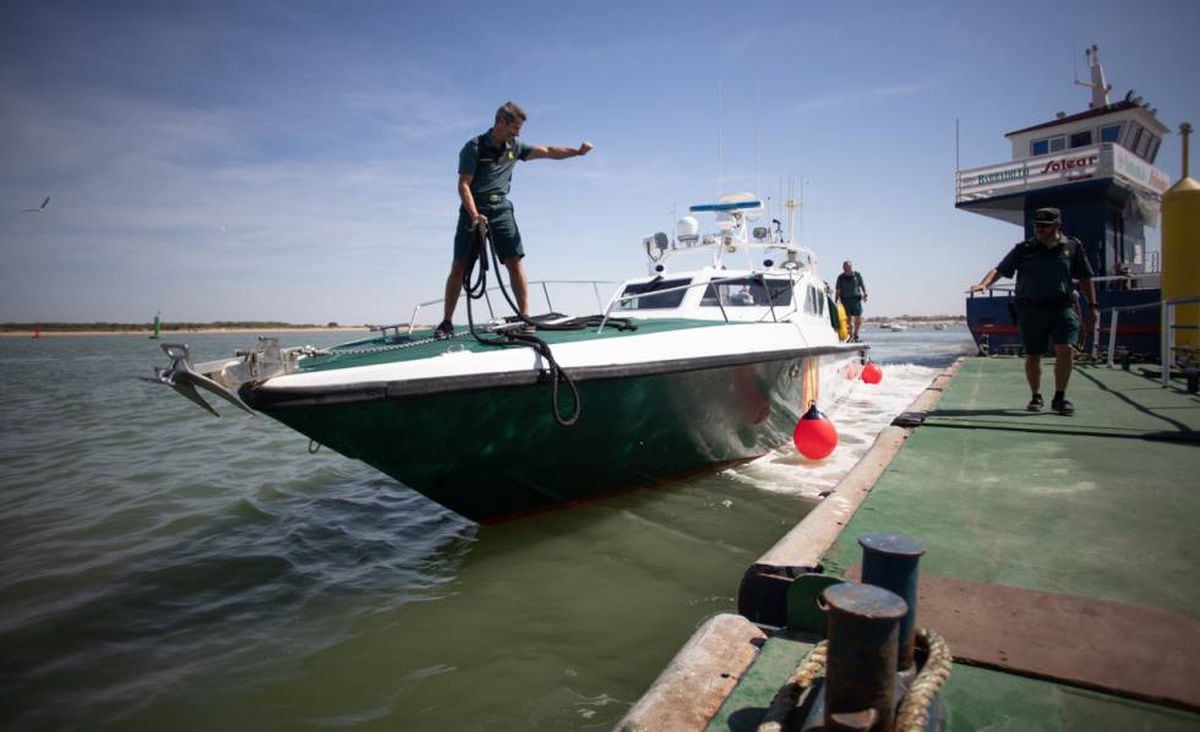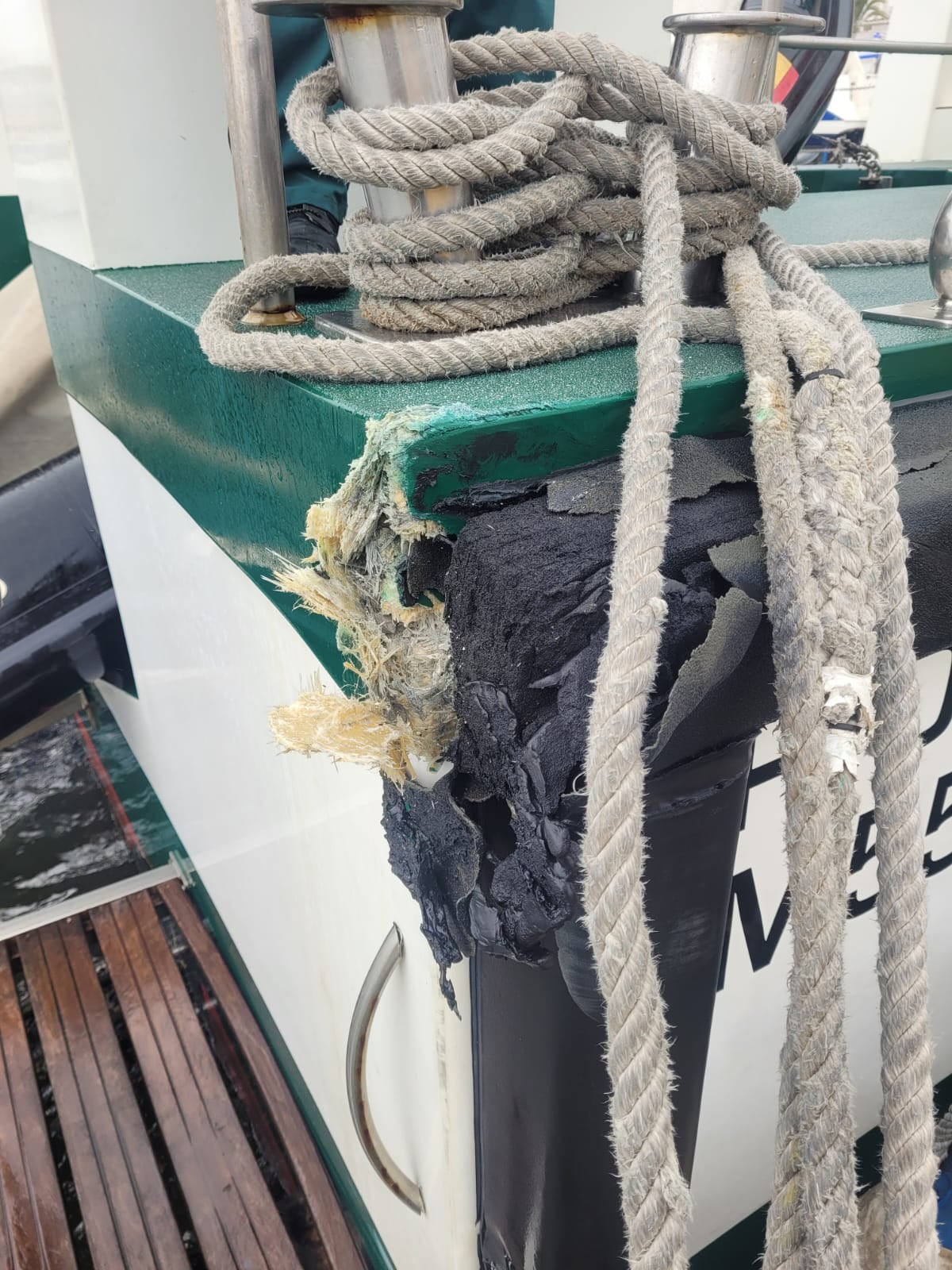Drug trafficking engineering continues to provide surprises for the security forces.
Agents of the Civil Guard have discovered in Vilanova de Arousa (Pontevedra) the first "aquatic dump" used by the cocaine and hashish smuggling networks based in the Rías Baixas to hide and test the gliding boats that they themselves manufacture, and which make available to different groups that operate in Galicia and the Strait.
This underground workshop, which was located on the ground floor of an industrial warehouse and which was accessed through a mechanical door, is one of the most curious findings of a cascade of police operations that has seriously affected the logistics of drug traffickers. drug.
In just one month, the Civil Guard and the National Police have intervened 54 gliders, as well as moulds, motors,
helmets and navigation technology.
In the raids, which have spread to Andalusia and Portugal, 94 people have been arrested.
The value of what was seized reaches 60 million euros, according to police calculations.
The manufacture, sale and rental of these boats, with outboard motors that allow them to reach speeds of up to 60 knots (110 kilometers per hour) in favorable sea conditions, has become an economic gold mine, exploited mainly by expert pilots in introducing caches across the Atlantic and the Mediterranean.
The successive police coups represent the greatest blow to the maritime infrastructure of drug traffickers, which affects the supply of various organizations that operate in the northwest and south of the Peninsula.
However, despite the magnitude of the operations, the researchers believe that only a minimal part of maritime logistics has surfaced and an even larger part would remain in the hands of other networks.
“There are several groups that are dedicated to providing logistics means, therefore,
More information
The silent voice of the great drug bosses in the Strait
The latest operation, deployed last Monday in the Arousa estuary, dismantled the network of Francisco Javier Otero Magdalena, a historic boatman from O Grove (Pontevedra), who was arrested in Algeciras (Cádiz).
In the same raid, another 17 Otero cronies have fallen and 18 boats have been seized, most of them in ships north of Portugal, where part of their components were assembled.
The detainees began to testify yesterday before the head of court number 3 of Cambados.
Up to 14 records have been made in warehouses and warehouses in Vilagarcía, O Grove, Cambados, Moaña, Ponteareas, Caldas and Vilanova de Arousa.
In this last locality, the aquatic dump was found in which the network tested the boats it manufactured and the motors.
One of the people arrested last day 28 in Cambados.
Salvador Sas Salvador Sas (EFE)
The raids were triggered as a result of locating in Pontevedra a powerful shuttle that the drug traffickers could not throw into the water as it got stuck in the crane of the truck that had transported it and the two responsible for the transport were arrested, who remain in prison.
This casual intervention chained another operation on April 7 in several towns of the Arousa estuary that resulted in 21 detainees and 25 boats seized.
At the head of this group, the Police place Pablo Vázquez, 34, and another drug trafficker, Ramón Bugallo Martínez, known as
Mon
, a relative of Sito Miñanco.
A week later, another severe setback was dealt to the network that supplied the main hashish trafficking organization in Andalusia with drug boats, which sent shipments from Morocco to Catalonia through the Ebro Delta. With 51 detainees, 10 boats confiscated and 10 tons of hashish intervened, the Civil Guard confirmed the links with the networks based in Galicia and Portugal for the manufacture of gliders.
Galician drug traffickers have always had allies in this business in the neighboring country, dating back to the days of tobacco smuggling.
Portuguese legislation is flexible with the activity of the shipyards and there are no prohibitions for fast sailboats to sail, as is the case in Spain.
The new generation of drug traffickers work as a service company and use discreet means in areas of difficult access.
The most powerful own shipyard in the history of drug trafficking was owned by José Ramón Prado,
Sito Miñanco,
in Cambados (Pontevedra), in a strategic place to line up the sea in the delta of the Umia River.
The Sipra (acronym for Sito Prado) prototype boats were the target of the Customs Surveillance boats in the 1990s, but they surpassed them in speed.
A police vehicle seized a boat in Pontevedra on Tuesday. Beatriz Ciscar (Europa Press)
Other organizations like the one that Ramiro Vázquez Roma built at the end of the 1990s also built their own arsenal of gliders.
From a discreet ship in the middle of the mountain, Roma threw himself fully into the business and set up his own naval network in Viana do Castelo (Portugal).
To climb a step further, the Galician capo even built a 25-meter shuttle commissioned by a Colombian cartel that used Guinea Bissau as a cocaine warehouse.
The company from Rome, Vianapesca even had the Portuguese Judicial Police as a client, according to the investigation.
After the fall of Vázquez Roma in October 2007, when he was directing the landing of four tons of cocaine in the Rías Baixas, Manuel Abal Feijóo took over,
alias
Patoc
or, which was the transport number until he died in a motorcycle accident.
Abal had several hiding places at the mouth of the Ulla River, where the gliders that he also manufactured were fine-tuned.
He built in Italy the largest shuttle that has operated in drug trafficking in Galicia to collect the shipments from the mother ships that later disembarked their own boatmen.
But the police managed to catch it by blocking its seven engines with sugar.
A police vehicle tows a boat seized during the operation against drug trafficking on the 26th in Pontevedra. Beatriz Ciscar (Europa Press)
Exclusive content for subscribers
read without limits
subscribe
I'm already a subscriber




/cloudfront-eu-central-1.images.arcpublishing.com/prisa/ARKKQ6UR5JG37ANJ7FYJ6OW6VM.jpg)
/cloudfront-eu-central-1.images.arcpublishing.com/prisa/IBM4BMDYA5ERBOQHEJXKOEPBAA.jpg)



